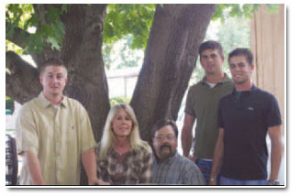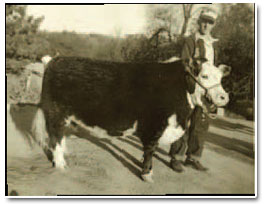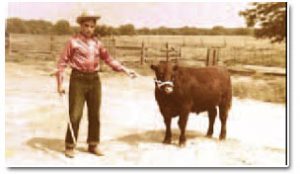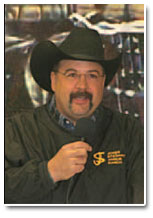About "The Continent"
The Story of Mid Continent Farms
The Story of Mid Continent Farms
Taken from Between the Pages – The Show Circuit
Written by Carrie Gilliam
 LOVE OF THE BEEF INDUSTRY
LOVE OF THE BEEF INDUSTRY
dates back to 1916, when talking about the Stewart family and Mid-Continent Farms cattle operation. Gregg Stewart, a partner of Mid-Continent Farms, re- cently sat down in the kitchen he also grew up in. Surrounding him was the beginning of the Stewart generational farm life. Letters to his great-grandpa, W.C. Mueller, sat all around the counter. The letters were dated by their yellow color and cursive handwriting. They were from farmers throughout Kansas and surrounding states inquiring about registered Polled Hereford bulls, Red Rock chickens, and local inquiries for eggs. Mueller sold a bull for $400, the same price as a new Model T Ford pickup at that time. Gregg is now a fifth generation stockman of Washington County, Kansas. The MCF partnership raises show steers and includes Stewart’s immediate fam- ily, including his wife, Debbie; their three boys, Garrett, Brigham, and Tucker; parents, Conrad and Deanna Stewart; and brother, Kent Stewart, with his children Derek and Devon Stewart.
With registered Maine-Anjou, Short- horn, Charolais, Simmental, Angus, and Chianina, plus a handful of Herefords, MCF owns 1,500 head of cattle representing various composites of the breeds and farm 1,500 acres of tillable ground. Gregg said their focus is on cattle. “We have always taken a practical approach to raising show steers,” Kent said. “We are a little more mainstream than the show industry has been.” To accomplish practicality, the Stewart family realized they needed to keep the basics in their herd and bought registered Angus cattle. “We decided to get involved in a big way to bring out the more functional traits of our crossbreds,” Gregg said. The operation started to breed their own Angus cattle when they found it hard to buy cattle that possessed the traits for which they were looking. It wasn’t a conscious effort to become Angus producers, Gregg shares. “Some sho w cattle herds don’t concentrate on the big picture. You can’t make practical advancements if you are only focused on phenotype.” From a resource standpoint, it was becoming costly to keep the Angus herd separate on the Kansas ranch, so they decided to spread out their marketing efforts and give the herd its own iden- tity. Gregg couldn’t have picked a better partner than the Ron Jones family of Benkelman, Neb. In 1995, they joined forces and created the Jones Stewart Angus Ranch. Jones said he bought half of the Stewart interest in the Angus herd and traded his show cattle to the Stewarts. He handles the development side of the business, because he has the facilities to handle the capacity of the herd. “Stewarts are pleasant people to work with and are always oriented on the quality of the cattle,” Jones comments.
w cattle herds don’t concentrate on the big picture. You can’t make practical advancements if you are only focused on phenotype.” From a resource standpoint, it was becoming costly to keep the Angus herd separate on the Kansas ranch, so they decided to spread out their marketing efforts and give the herd its own iden- tity. Gregg couldn’t have picked a better partner than the Ron Jones family of Benkelman, Neb. In 1995, they joined forces and created the Jones Stewart Angus Ranch. Jones said he bought half of the Stewart interest in the Angus herd and traded his show cattle to the Stewarts. He handles the development side of the business, because he has the facilities to handle the capacity of the herd. “Stewarts are pleasant people to work with and are always oriented on the quality of the cattle,” Jones comments.
THE ROOTS
 Uncle Adelbert Stewart and “Red Cap” circa 1949 at a livestock judging contest at Kansas State University. Red Cap was the reserve Grand Champion at the American Royal for KSU. Miles McKee, a student at that time and later an educator at KSU, helped care for & groom Red Cap.
Uncle Adelbert Stewart and “Red Cap” circa 1949 at a livestock judging contest at Kansas State University. Red Cap was the reserve Grand Champion at the American Royal for KSU. Miles McKee, a student at that time and later an educator at KSU, helped care for & groom Red Cap.
In WWII-era Kansas, Ray Stewart (Gregg & Kent’s grandfather) kept a cowherd and sold mules to the U.S. Army. Their father, Conrad, was more interested in the cash grain business and feeding out cattle. Gregg remembers, “Dad always said Grandpa was an ‘ole mule skinner’, so Kent and I came by trading livestock naturally.” Cow-calf pairs generally weren’t involved in the immediate family until 1980. Gregg gives the credit for starting the business to 4-H and FFA. He joined the Farmington 4-H Club when he was seven years old, but said, because of his brother, he has shown cattle since he was old enough to remember doing so. Gregg also participated in woodworking, cooking, horse, and market sheep projects. His mother, Deanna, was also a 4-H leader for several years, guiding Gregg and Kent to do their best in each project. “Mom was always the one to haul us around to the steer shows,” Gregg recalls.
The brothers enjoyed their steer projects and saw their future in it. “We are fortunate to do something we have al- ways had a love for,” Kent shared. 4-H allowed the brothers to start livestock judging, which led to FFA and collegiate judging. Both were on judging teams at Colby Community College and Kansas State University (KSU). The business began to receive nation- al interaction when the young men vis- ited farms for livestock judging practice. Gregg said they would work out a deal with the producer while they were there to judge. At that time, they started sign- ing contracts to artificially inseminate more than 1,000 cows a year for several different herds and in addition were given first pick of the calves. They also bought bulls to clean-up those cows. At seventeen and nineteen years of age, the boys sought out sales and breed- ers around the country to begin purchasing cattle of their own. Their dad trusted their competence and sense of responsibility, while letting them make their own mistakes. “Our dad was the type you wanted buying your cattle. He knew what he wanted and wasn’t afraid to pay for it,” Gregg recounts. “It helped that he had a great eye for conformation.” Their first major purchase was 40 bred Chianina heifers from the Mile High Ranch in Colorado and 40 cows locally. To this day, Stewarts still have MC Cowboy bloodlines, originating from the first 40 heifers. With the help of their parents and experience, the business grew quickly, and the Stewarts needed an official name. Recalling a name first used by the Dennis Aherin, a friend on the livestock judging team at Colby Community College, they chose Mid-Continent Chianina, because of their centralized location within the U.S. They changed the name to Mid-Continent Farms (MCF) as their operation began expanding to different breeds and various parts of the country. Cattle have been sold to customers as far away as California in the west and Maryland in the east, from Canada to Central America. To help them keep up with their grow- ing business, they have also expanded their organized sale efforts. MCF has a heifer and a steer sale each fall, the MCF and Partner’s sale at the farm of their good friend and partner, Steve Courville, in Illinois each October, and the Jones Stewart Angus sale in March. They are also growing in Texas. Kent lived around Washington and helped with the day-to-day chores during the operation’s first 20 years, but for the last 10 years he has lived in Franklin, Texas, and is helping the family operation grow in sales. Kent feels that it helps that he was originally a cow-man and knows the cattle business when he speaks to MCF customers. Derek, Kent’s son, works for him full-time with the cattle they raise and sell. Derek is also a professional steer wrestler. Kent’s daughter, Devon, helps mostly at shows and sales, because she is concentrating on school at Kansas State University.

Conrad Stewart (Gregg & Kent’s father) exhibited the Grand Champion Steer at the Washington County Fair in 1952.
The Stewarts also offer a value-added service. Their sales aren’t just about selling bulls and making a profit, Brigham Stewart asserts. Brigham received his bachelor’s degree from Kansas State University in Animal Sciences And Industries, moved back to the farm in Washington, and helps the business continue to grow and evolve. The operation now offers customer service, helping clients find a show calf, helping clip before a show, and offering advice on feeding. Now Brigham and his two brothers are old enough that they can create even more credibility for the operation. “Customers may buy a calf,” Brigham reveals, “but they are also getting the service we can provide for them.” Many exhibitors may see the Stew- arts around at shows. “Even though we are working with clients and sales, we consider shows our vacation. We help with the show preparation for the cattle we sold or own a piece of and enjoy our time away from the farm,” Brigham ob- serves. The operation is gaining more national exposure by their extra services and the new generation of Stewarts. Garrett, Brigham, and Tucker competed on very successful livestock judging teams at Butler Community College. All three boys were honored with collegiate All-American Awards. The boys went on to judge at Kansas State University. Garrett had numerous livestock judging and reasons wins, including high beef contestant at the American Royal and was presented the Bell Award at KSU, an honor bestowed on the out- standing collegiate livestock judge. Brigham was the high individual at the National Collegiate Livestock Judg- ing Contest in Louisville, Kentucky, where he was also co-high in reasons. That reasons score was a record and still stands today. Like Garrett, he also won the Bell Award at KSU. Tucker was also an accomplished livestock judger for KSU and Butler Community College and was a member of the Reserve National Champion Team for KSU at Louisville. “I judge at several shows around the country giving the operation more exposure to who we are,” Brigham said. Whether Brigham is on the road or not, Tucker comes home on the weekends to work on the farm. He is a KSU senior, graduating in May in Animal Sciences And Industry, with a pre-law option. Debbie said work on the farm has al- ways been the number one priority in all of their lives. “There was never a silver spoon,” Debbie shares. “I always thought Gregg was hard on the boys while they were growing up, but because of the hard work they’ve done, they can handle life’s challenges.”

EYE ON THE FUTURE
Through hard work growing up and the beef industry in their blood, the new generation of Stewarts know the operation isn’t just always sales, shows, and having fun. With the help of Gregg’s three sons the business is using innovative ideas. MCF was one of the first operations to use live-bidding via the internet in their sales. The MCF and Partners sale is utilizing online capabilities by allowing people to make bids on their website. It’s convenient option for customers and al- lows the business to attract new clients. The family believes they will continue to grow once they have a veterinarian in the family. Garrett, a fourth-year veterinary student at the Kansas State University College of Veterinary Medicine, received the Veterinary Training Program for Rural Kansas. Be- fore receiving the award, he helped push this piece of legislation through, with help from state representative and great aunt, Sharon Schwartz (granddaughter of MCF fore-father, W.C. Mueller). Schwartz observes that there is a shortage of large-animal veterinarians in rural America, especially Kansas, and the costs of school and start-up fees for practices are not helping the issue. She contends that this piece of legislation entices people to come back to rural Kansas, and when the 2016 census comes she’s optimistic it will stay in the state budget. The program allows five first-year veterinarian students to receive this award each year. The students receive $20,000 a year for not more than four years. The culmination of this arrangement will be when students finish their degrees and return to rural Kansas, at which time their loans are forgiven. “The legislature is proud of Kansas for taking the lead on this issue, and other states are replicating us,” Schwartz comments. “Without Garrett bringing the issue to my attention, I know this program would not exist in Kansas.” Garrett also participated in the legislation by testifying for the bill and being part of committees. Garrett has already utilized his veterinarian skills on the farm by helping pregnancy check cattle, giving input on herd health practices, and transferring almost 50 embryos in the spring. Gregg is happy how his boys and the rest of his family are helping the operation prosper. “I’ve never had to push my boys to be interested in the business, it just came natural to them,” Gregg observes. “You can’t hire the invested interest my family has in the beef industry.

